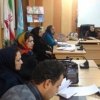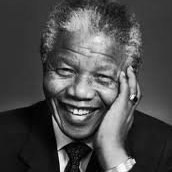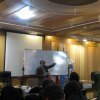
Nelson Mandela death: Icon, reconciler, fighter and charmer
Nelson Mandela death: Icon, reconciler, fighter...
 During the course of a long, tumultuous life, Nelson Mandela juggled many roles. It was that ability, as a leader, to transform and adapt to changing circumstances which may well hold the secret to his lasting achievements.
During the course of a long, tumultuous life, Nelson Mandela juggled many roles. It was that ability, as a leader, to transform and adapt to changing circumstances which may well hold the secret to his lasting achievements.
Here, then, are the four key roles that I would pick out of the pile. They were not all roles of his choosing, but they may go someway towards defining the legacy of one of the great leaders of the last century.
Icon
The world has come to know the smile, the stoop, the gravel voice and grey hair.
But for the 27 years he spent in jail, Nelson Mandela was a mysterious, abstract figure - his image and even his name unprintable inside apartheid South Africa.
The man was transmuted into an icon, a symbol of resistance whispered in the townships and revered around the world.
The African National Congress (ANC) overcame legitimate qualms to back the notion of a Mandela "brand".
"There were a lot of debates - I can remember asking why we're singling Nelson Mandela out. But the idea of an icon does work - perhaps unfortunately," remembers Ronnie Kasrils, a member of the ANC's armed wing.
As that icon, Mr Mandela played a vital role, not only in galvanising the struggle within South Africa, but perhaps more importantly in rallying support for international sanctions - among the more powerful weapons in the fight against apartheid.
Many factors, not least the end of the Cold War, led to the collapse of white minority rule, but the abstract image of a solitary, defiant man, unjustly imprisoned for almost three decades, cut to the heart of South Africa's predicament.
Reconciler
"A different leader… would have said: 'OK, these people oppressed us for many years. Let's kill them.' But the stance he took will be remembered by all South Africans and all people of the world," said the famous South African photographer Alf Khumalo before he died in 2012.
The icon role was important, but Mr Mandela's defining contribution to South Africa's revolution was as reconciler-in-chief - first during the bold, risky negotiations he conducted with the apartheid government while he was still in prison, and later during his exhaustive attempts to reassure a nervous white minority - some still argue he bent over too far protecting their business interests - and to calm the rage of an impatient black majority.
There were many key moments - the Rugby World Cup final in 1995 springs to mind, when Mr Mandela presented the cup to the South African team captain.
But none defined his leadership more, or played a more crucial part in averting civil war, than his interventions immediately after the 1993 assassination of the struggle hero Chris Hani.
"Tonight I am reaching out to every single South African, black and white, from the very depths of my being," said Nelson Mandela on national television, warning that "our whole nation now teeters on the brink of disaster".
"He saved the country. No doubt about it," remembers veteran South African journalist Allister Sparks.
"That's when the natural power of leadership rose up. The whole country recognised it."
Fighter
He may have become a reconciler, but Mr Mandela will also be remembered as a radical, a rebel and a "young firebrand" who helped to push the ANC away from its rather gentlemanly opposition to apartheid and into a violent confrontation with white rule.
It was Mr Mandela who initiated and led the armed struggle, despite his lack of military experience.
"We had no choice but to turn to violence," he wrote in his autobiography. "I who had never been a soldier… had been given the task of starting an army."
This is the most divisive part of Mr Mandela's life and legacy.
He was branded a terrorist by the South African government. In the 1980s, Britain's then-Prime Minister Margaret Thatcher's spokesman described the ANC as "a typical terrorist organisation". Today, most white South Africans cherish Mr Mandela's contribution to the country's peaceful revolution, but a handful both here and abroad will no doubt continue to focus on, and condemn, his militancy.
Today that militancy is also emphasised - and celebrated - by some black South African politicians.
The fiery former ANC Youth League President Julius Malema told me that foreigners "know nothing of Mandela" and are attempting to subvert his radical agenda.
Mr Malema's colleagues say they are carrying on Mr Mandela's true legacy by pushing for the nationalisation of white businesses and the seizure, without compensation, of white-owned land.
Charmer
Mr Mandela was a powerful public speaker. But when he emerged from prison he could also appear stiff and regal in front of a crowd.
His real strength - his political genius, you might argue - lay in his one-to-one interactions with people of all walks of life.
"He had a gift for personal intimacy," is how veteran journalist Allister Sparks describes it. "No-one was too small to be of real interest to him."
It was that gift, among others, that helped him rise through the ANC, and to maintain his "first-among-equals" status in prison.
Later it helped convince the apartheid government's representatives, who visited him in jail to negotiate his release, that this was a man they could trust. Had they not, South Africa's revolution could have lasted much longer, and been far more violent.
Some later worried that Mr Mandela's charm had turned his head, that he kept some unsavoury friends, and was too enamoured of celebrity culture.
But most South Africans were quick to indulge him and even to enjoy the all-too-human foibles of a man they knew was much more than a mere "saint".
BBC
 Reload
Reload


